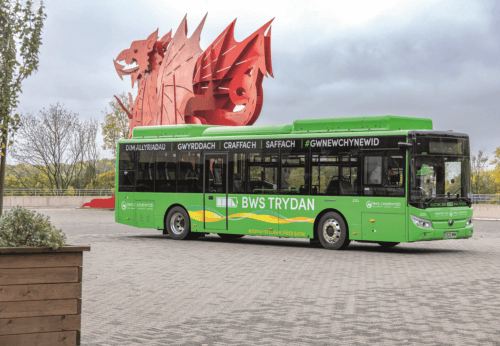
The journey to a fully electric bus fleet cannot be an immediate one, but it is a journey that Newport Transport has put its heart and soul into since 2019. Richard Sharman visits the Welsh city to find out about the progress made so far
Cast your mind back to 2019, before the advent of Covid-19. The topic that was very much at the forefront of the news was global warming. At the same time, the United Kingdom was in the process of leaving the European Union. The early months of the year were eventful for the Welsh Government and the future of the environment. In March that year, the Welsh Government produced a document called ‘Prosperity for All: A Low Carbon Wales’; it set out 100 policies and proposals to meet its 2020 carbon emissions targets. The headline for buses in this document was to that it was ‘aiming to reduce the carbon footprint of buses to zero by 2028.’
Then on 29 April the Welsh Government declared a climate emergency and committed to achieving a carbon neutral public sector by 2030 and to coordinating action to help other areas of the economy to make a decisive shift away from fossil fuels, involving academia, industry and the third sector.
Newport ahead of the curve
Prior to the Welsh Government making that announcement in April 2019, Newport Transport had already taken the important first step in addressing the climate emergency it faced in the city. The municipal bus company had put the wheels in motion to move to zero-emission buses, and it was announced on 6 February of that year that it would receive £1,342m of funding from the Ultra-Low Emission Bus (ULEB) scheme. Newport Transport also received an additional £2.8m from the ULEB fund thanks to underspending, and which was offered by the Department for Transport as it believed Newport Transport had used the initial funding efficiently. The second tranche of funding allowed the procurement of 16 extra Yutong buses, taking the total to 32.
As part of its bid, Newport Transport worked in partnership with Yutong UK, Pelican Bus & Coach, and battery storage specialist Zenobē Energy. Zenobē also works with the Low Carbon Vehicle Partnership (LowCVP) to ensure all projects are zero-emission and are compatible with the standards set in the UK Government’s ULEB scheme.
Ian Downie, Head of Yutong UK at Pelican Bus & Coach, explained: “When we first discussed zero-emission vehicles with Newport Transport, they wanted to pioneer air improvements in Newport, but wanted to evidence the zero-emission vehicles’ capabilities of range and quality.
[…]By subscribing you will benefit from:
- Operator & Supplier Profiles
- Face-to-Face Interviews
- Lastest News
- Test Drives and Reviews
- Legal Updates
- Route Focus
- Industry Insider Opinions
- Passenger Perspective
- Vehicle Launches
- and much more!


